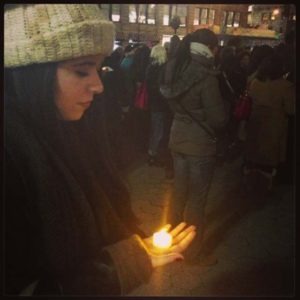Only days before she would have celebrated the new year, a 23-year old student in New Delhi, India was brutally beaten and raped on a bus by a group of six men. Thirteen days after the attack, she died. The story of her life and death have now been told and re-told so many times in Indian media that the sensationalism outweighs the fact that this was the actual narrative of an actual person. However, it’s now clear that this was an incident that gripped the national consciousness in a way that countless other, similar sexual assaults did not.
On the whole, it is gratifying to see dialogue about sexual assaults on women. However, I find the non-Indian media’s subtle emphasis that the assault was perhaps particular to the subcontinent troubling. Because the truth of the matter is that rape and sexual assault are the bane of women the world over. As Nicholas Kristof wrote in early January in his piece titled, “Is Delhi So Different from Steubenville,” “Americans watched the events after the Delhi gang rape with a whiff of condescension at the barbarity there, but domestic violence and sex trafficking remain a vast problem across the United States.” A vast problem, indeed. As Women Organized Against Rape states on their website, “Every two minutes someone somewhere in America is sexually violated.”
Take for instance my hometown of Philadelphia, Pennsylvania. In the last few months of 2012 alone, I can think of at least one incident of sexual violence whose details are eerily similar to the incident in New Delhi. On December 25, only days before the young woman from New Delhi died in a hospital room in Singapore, three teens in Philadelphia carjacked a 22-year old woman and drove around for five hours, raping her.
And in October, three men were accused of kidnapping a 15-year old girl and assaulting her for days. But that’s just two of dozens of assaults that occur every year. And they took place right here, in the United States of America.
Were there a series of oversights by the New Delhi police that may have prevented such a tragedy? No doubt. Reports state that the bus with the New Delhi victim and her attackers passed several police checkpoints without being inspected. Are there weaknesses in the Indian justice system that let perpetrators of sexual assault avoid sentencing? Absolutely. But are brutal sexual assaults a Third-World problem? Absolutely not.
And so, it remains important that constituents support their Representatives as they seek to reauthorize the Violence Against Women Act (VAWA). Read more about it on the website of the National Task Force to End Sexual and Domestic Violence Against Women.
The good news is VAWA just passed in the Senate, albeit with opposition. Currently, the Act is in the House and on the verge of passing – a solid first step. But it is imperative that we continue to talk about sexual assault and how it can be stopped. For the New Delhi rape victim, yes, but also for the countless other unnamed victims.
………………………………………………………………………………………………………………………………………………………………………
VAWA: Confused by VAWA? Here’s what you need to know from the National Task Force to End Sexual and Domestic Violence Against Women FAQ:
- the Violence Against Women Act applies to all victims of domestic violence, irrespective of their gender
- Victims of intimate partner violence are overwhelmingly female; A recent study reports that women compose 84% of spouse abuse victims and 86% of victims of abuse by a boyfriend or girlfriend
- Many enhancements in VAWA 2005 will ensure that the original spirit of the legislation – comprehensive services to victims of domestic violence, dating violence, sexual assault, and stalking













